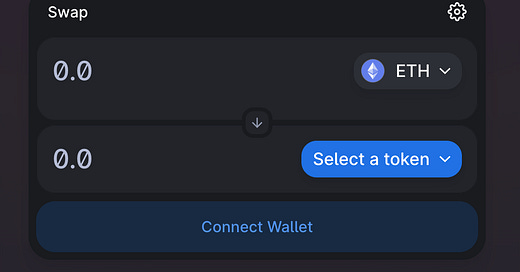Universal web identity record, the web3 wallet
An intro to one of the most important things in web3.
The web3 wallet is like email, but 10x better and more convenient
When you first get into web3, the first thing you’ll likely have to do is to set up a wallet. You need one because that’s where you’re going to store cryptocurrency and NFTs. It’s also what you use to log into web3 apps. Think of it as ‘email’ when you first got into the internet.
Everyone needs an email to unlock the full potential of the internet. The same goes for the wallet to unlock web3.
I’d argue using wallets are much simpler than email logins. You connect a wallet, click a button, and voila! No need to type anything; no passwords to remember.
Using other web3 apps is just as simple. Again, just connect a wallet and done. No signups or long forms needed. It’s a universal web3 passport that works out-of-the-box with any web3 app. Talk about interoperability1
Like a universal passport, you can login to different apps easily. But, it also means all the data and transactions you do across all these apps are stored in the same wallet.
Another important feature of a web3 wallet is you fully own it. Not Facebook, not Google, not your airlines loyalty club, you. And because you own this wallet, and all the data that is stored in it, it changes things.
You can do anything with this wallet! Even give it away. The next section explores why this is interesting.

Your web3 wallet lets you create a digital legacy, and the freedom to give it away
Imagine two internet logins—a Reddit account and an airline loyalty program. If you’re a Reddit user, you probably know the concept of karma, points you earn as you are more active and engaged in the social platform. For airline loyalty programs, they typically have status tiers e.g., Singapore Airlines’ KrisFlyer Status Tiers.
In both examples, it takes either a lot of effort or a lot of money to earn points and status. Users spend years building up a reputation in Reddit. Through sheer effort and goodwill, Redditors collect karma and awards. For frequent fliers, many bank accounts have been burdened to reach and keep a status tier.
And then what?
The hardcore Redditors can’t do much with all those karma points or awards outside of Reddit. What happens to all that time, effort, and attention sunk into the platform? Reddit keeps all that value. It’s not within a user’s power to sell their hard work.
Someone with a KrisFlyer Solitaire PPS Club status can’t benefit from all the money they spent with the airlines when they don’t happen to be travelling. It’s not like you can rent out your status to someone else…
But what if all that karma and status was in a web3 wallet?
If all these logins and loyalty programs subscribed to the web3 way, then all the history and legacy of user activity would all get recorded against a user’s wallet. The same wallet that you can do whatever you want with.
In a web3 paradigm:
You can sell your Reddit account, if you wanted to
You can rent out your Reddit account, if you so fancied
You can pass on your Reddit account, if you wanted your kin to inherit it
You can sell your KrisFlyer PPS, if you’re flying with Qantas now
You can rent your KrisFlyer PPS, if you needed a 2-year hiatus from flying
For companies, it’s a data and retargeting treasure trove
It’s not all just consumer benefits. The flip side is also beneficial for businesses. With all the data aggregated into a wallet organized into reasonably standard formats, consumer analytics can be taken to a whole new level. I won’t dwell on this too much for this post.
Dive into web3 and start building your (wallet) legacy
The freedom to transfer user-owned wallets is just the tip of the iceberg. It’s literally just the ‘email’ equivalent of the web. Dive in.
The exchange of data (in this example alluding to the ‘signup information’ of web2 for logins) can be transferred without any intermediaries or additional requirements.




